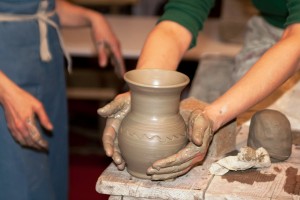For a correct definition of Experiential Tourism
ATTENTION: AFTER AN EXPLANATION OF THE TOPICS, WE RECOMMEND READING THE NEW UPDATED ARTICLE:
From the economy of experiences to experiential tourism

Article excerpted from a lesson of the course: Basic Course for Cultural Tourism Operators.
For some years now what is called "Experiential Tourism" has been gaining ground. We are witnessing a cultural evolution of what concerns the tourist use, we pass from a tourist package where the tourist has a role as a spectator (passive), to a tourist offer where the guest becomes the main (active) actor of the same offer. In the new forms of tourism, the tourist package, sometimes understood as a set of tourist services (hospitality, accommodation, catering, entertainment, transport, etc.), is essentially made up of the same emotions experienced by the customer. The tourist offer tends to transform itself more and more into a real life (and educational) experience, able to emotionally, intellectually and physically involve the guest. In light of the often uncontrolled and unregulated diffusion of the phenomenon, it is useful to identify the elements that distinguish a real experiential offer from a simple tourist offer that bears only the label of experiential. This is important not only for the tourist who has to choose among the countless offers in the area but also for tour operators who intend to offer real and quality experiential tourism.
The sector bibliography does not provide a formal and univocal definition of experiential tourism, we will try, in this article, to provide one, starting from some basic concepts.
The concept of "experience"
Experience: Form of direct knowledge, personally acquired through observation, use and practice, of a specific sphere of reality (Treccani).
Experiential learning is a learning model based on direct experience. It was studied by two great pedagogists such as John Dewey (1859-1952) and Jean Piaget (1896-1980) and by the psychologist Kurt Zadek Lewin (1890-1947), but it spread thanks to David Kolb (1939) who, on the basis of previous studies, developed the "theory of experiential learning".
From the emotional point of view we can think of the experience as something that is able to trigger an emotion. We could theoretically say that each tourist offer in itself makes us learn something. So we could classify all tourist offers as "experiential offers" as they are capable of involving us on an emotional, physical and intellectual level or making us learn something (not necessarily in positive terms).
The experiential offers are certainly able to make you feel emotions, and therefore, from an emotional point of view, the definition of "experience" is justified for them but it is on the concept of learning, and on others that we will see shortly, that they find the true terminological basis and on which the content of our attempt to provide a formal definition of "Experiential Offer" is based.
The experiential offer is a cultural offer
Let's start with the definition of cultural tourism provided by the World Tourism Organization (OMT): "Cultural tourism represents all those movements of people motivated by cultural purposes such as study holidays, participation in live shows, festivals, cultural events, visits to archaeological sites and monuments, pilgrimages. Cultural tourism also concerns the pleasure of immersing oneself in the local lifestyle and in everything that constitutes its identity and character ". Cultural tourism has as its main motivation the use of cultural assets. Cultural property can obviously be material (monuments, churches, museums, castles, historical and archaeological sites, etc.) but also immaterial, in its broadest sense and in accordance with the definition of Intangible Cultural Heritage provided by the UNESCO Paris Convention of 2003. which also identifies the areas of human activity with which this heritage is manifested:
- Traditions and oral expressions;
- Performing arts;
- Social practices, rituals and parties;
- Knowledge and practices concerning nature and the universe;
- Traditional handicraft.
We believe that many of us will agree that the experiential offer "allows you to immerse yourself in the local lifestyle and in everything that constitutes its identity and character", if this is true we can say that the experiential offer is a cultural offer.
Definitions of Experiential Offer
Experience offer in a broad sense (Experience)
"It is a unique, authentic experience, based on human relationships, which allows to deepen the knowledge of local identity elements as well as to acquire multisensory experiences" (Ignazio Caloggero)
Experience offer in the strict sense (Full Experience)
“It is a unique, authentic experience, based on human relationships, which allows to immerse yourself in the local lifestyle and in everything that constitutes its identity, allows you to acquire multisensory experiences through direct participation in the activities that make up the offer "(Ignazio Caloggero)
What differentiates a simple experiential offer in the broad sense from an experiential offer in the strict sense is precisely the direct (active) participation of the guest in the activities that make up the experiential offer. It is thanks to direct participation that we can use the term "immersion", in fact the guest "plunges" into the experience, becoming an active actor of the experience itself. This aspect underlines and strengthens the transition from a dimension of "entertainment" to that of "education".
The experiential offer is therefore to be considered as a "concrete experience" and is the main component that characterizes experiential tourism.
Characteristics of the experiential offer
Let's analyze some single aspects of the definition of Experiential Offer
- It is unique and authentic
- It is based on human relationships
- It allows to acquire multisensory experiences (involvement of the senses: sight, hearing, touch, smell and where possible, taste)
- It allows to deepen the knowledge of elements of local identity
- Learning through direct participation of the host in the activities (experiential offer in the strict sense)
1) Uniqueness and authenticity of the tourist experience

The uniqueness and authenticity of the experience lies precisely in the nature of the offer. The experiential offering is not a serial and mass offering. The products and services, possibly included in the offer, are only an indirect aspect, the essential components are emotions, sensations, the ability to “feel” and “discover” something different from usual.
2) Human relationships

The experiential offering is characterized by a strong human relationship that is created between those who offer the experience and those who receive it. There is a form of personalization of the experience, also based on the personality of the tourist who takes on a central role. The empathic communication skills that those offering the experience should have, receiving "sensations" are linked to the relationships that are created during the experience, also favored by the presence of a limited number of people who simultaneously benefit from the experiential offer
3) Multisensory experiences
The experiential offer is of a multisensory type, the senses involved in general, even without direct participation are more than one based on the type of offer and the case, for example, of tasting typical products where at least the following senses are stimulated: sight, taste, smell and hearing (if products are described).
4) Knowledge of elements of local identity
The experiential offer is usually associated with elements of local identity: places, stories, typical products, uses, customs and traditions. We are therefore in the presence of a form of learning, which can obviously be strengthened in the event of direct participation in some of the phases that make up the offer itself.
5) Learning through direct participation

The experiential offer, especially if carried out through direct participation, is a form of learning, in fact it allows you to learn something new through the learning model called "Experiential Learning" which sees direct and physical involvement in the activities associated with tourist offer (Ex: cooking, harvesting, milking, making handicraft products, etc.) and through the involvement, if possible, of the 5 senses: sight, hearing, taste, smell and above all, touch. The 5 senses are certainly involved in the experiential offers related to food and wine, in others, such as the creation of handicrafts, the taste may not be stimulated but it certainly remains a multisensory experience if all the other senses are activated and if you have a real and direct participation.
We can summarize by indicating the typical elements of the experiential offer:
- Learn something new through the learning model called "Experiential Learning"
- knowledge of places and elements of local identity and uniqueness
- create a bond with local people to hear stories based on their real experience
- knowledge of traditions, customs and typical local products
- presence of a limited number of people who simultaneously take advantage of the experiential tourist offer
- personalization of the experience, also based on the personality of the tourist who plays a central role
- lack of a rigid organization in the fruition of the experiential offer
- ability to surprise
Experiential Tourism
"Experiential Tourism is a form of cultural tourism based on one or more experiential offers"
For those interested in learning more about the topic, it may be useful to attend the online course where the individual elements are analyzed to recognize an experiential offer, explained how to transform a simple experience into a real experiential offer, the methodologies to present and promote an experiential offer and presented some practical examples taken as reference.
The course is provided on the E-Learning platform www.faditalia.it
The course, upon request, is also available in residential mode. Centro Studi Helios srl. 0932 229065 info@centrostudihelios.it

Experiential Tourism Database
Select your experience among those present in the database



